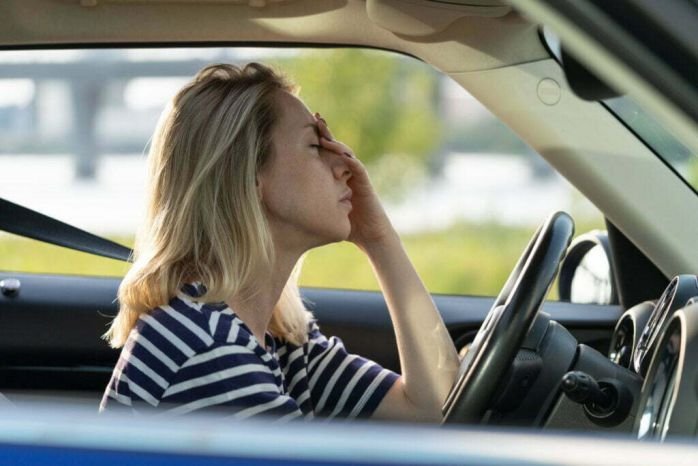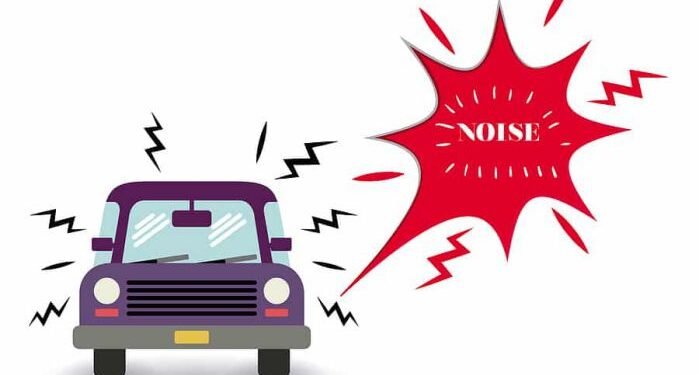We’ve all been there – cruising down the road and suddenly your car starts making an unexpected grinding sound. It’s never a fun surprise and can be pretty worrisome too. But don’t panic just yet! In most cases, a new noise while driving isn’t a major issue. In this guide, I’ll share some common culprits for that grinding and provide tips on diagnosing the problem yourself or with a mechanic. By the end, you’ll have a good idea how to identify and address the root cause. Let’s get started!

Common Causes of a Grinding Noise When Driving
There are a few key systems in your car that could potentially cause a grinding sound, so let’s review some of the most likely suspects:
Brake System Issues
Anything related to your brakes is a prime suspect when wheels are turning but grinding can still occur even when you’re not braking. Common issues include worn out brake pads, seized brake calipers, or a loose or damaged brake rotor. A visual inspection of the brakes can often reveal the problem like pads worn down to the metal backing plate.
Worn Out Bearings
Your wheels‘ hub bearings and wheel bearings allow the wheels to spin freely. Over time bearings can wear out, developing play or roughness that causes a grinding sensation – especially noticeable when making slower turning movements.
Damaged CV Joints
CV (constant velocity) joints connect your drive axles to the transmission and help transfer power to the wheels. Worn or damaged joints may produce clicking or grinding sounds during turns or take-offs. This is typically more common on front-wheel drive vehicles.
Transmission Problems
Grinding could potentially point to internal transmission issues like worn out gears or damaged synchros. It’s usually accompanied by slipping, delayed shifts or inability to change gears smoothly. Any transmission noise warrants further diagnosis.
Diagnosing the Source of the Grinding Noise
Pinpointing exactly where the noise is coming from is key to addressing the root problem. Here are some diagnostic steps:
Visual Inspection
Raise the car safely on jack stands and check for obvious signs of wear like brake pads, noisy bearings or bushings, bent components, and fluid leaks. Look under and around the trouble area.
Professional Mechanic Diagnosis
For tricky noises, an experienced auto tech with specialty tools like a stethoscope can better isolate where the sound originates from. Their diagnosis saves time vs guessing.
Drive Variations
Note if the grinding is constant or comes and goes. Does it change with engine rpm, vehicle speed, braking, or turning the wheels? This hints at which system could be at fault.
Monitor Fluid Levels
Low brake, transmission or power steering fluid levels could point to leaks tied to internal component wear causing noise. Top fluids off as needed.
Common Repair Solutions for “Car grinding when driving”
Once you’ve identified the culprit component, it’s time to investigate repair options. Here are specifics on fixing some typical noise-causing issues:
Replacing Brake Components
Worn brake pads, rotors, calipers or slides usually just need replacement. Make sure slides move freely when repaired.
Bearing Replacement
Bad wheel or hub bearings require removal and installation of new bearing assemblies. It’s wise to replace in axle sets for balance.
CV Joint and Axle Repair
Damaged CV joints may require joint replacement or full axle overhaul due to inner component wear. Rule out worn bushings too.
Transmission Servicing
Fluid exchanges, filter changes and tune-ups can fix some noises. Internal overhauls handle advanced cases of gear or synchronizer wear.
Prevent More Repairs With Proper Vehicle Care
Beyond just addressing the immediate concern, focus on preventive maintenance to avoid future repairs:
Regular Vehicle Check-Ups
Schedule standard maintenance like fluid/filter changes based on your owner’s manual. This catches small issues before they worsen.
Listening for Early Warning Sounds
Pay attention to new sounds that could indicate pending component wear. Catching noises promptly allows less costly repairs.
Adhering to Manufacturer Service Intervals
Following the maintenance schedule set by your automaker helps ensure components last their designed lifespan before needing replacement.
Some Additional Tips
- Replace worn components like brake pads in sets for even wear rather than one side at a time.
- Inspect suspension bushings, ball joints, and tie rods for play as worn parts can stress other components causing failures.
- Use high quality fluids recommended by the owner’s manual for your climate – it protects sensitive parts from corrosion and debris.
- Check tire pressure weekly as underinflation worsens suspension part wear over time.
- Consider preventive replacement of maintenance items like spark plugs, hoses, belts before extreme wear causes larger problems.
With proper vehicle upkeep and response to noises when they emerge, you can avoid many frustrating and expensive car repairs down the line. Avoid the panic – armed with knowledge of common causes, follow your diagnostic process to pinpoint the source and address the root of that grinding sound promptly! Let me know if you have any other automotive questions.
RELECT:
- 6 Tips How to change lanes safely while driving
- One of the Many Techniques to Safe Driving is Predicting
FAQs
Here are some answers to common FAQs about grinding noises when driving:
Q: Grinding noise when driving at low speeds back of car?
A: Issues that commonly cause grinding noises from the back of the car at low speeds include worn rear brake pads, a damaged rear differential/axle, or failing wheel bearings. Have a mechanic inspect the rear brakes and suspension components.
Q: Grinding noise when driving at low speeds front of car?
A: Front end noises are often due to worn brake pads/rotors, bad wheel bearings, or issues with the CV joints/axles. Have a mechanic inspect the front brakes, wheel hubs, and steering/suspension parts.
Q: Is it safe to drive with a grinding noise?
A: It depends on the cause, but generally try not to drive too far or at high speeds with new grinding sounds. The noise could indicate components that are damaged/wearing and could fail if driven excessively. Get issues diagnosed promptly by a pro.
Q: How do I stop my car from grinding noise?
A: To resolve the noise, have a mechanic properly diagnose the issue, like checking brakes, wheel bearings, CV joints, etc. The fix depends on the cause, like replacing worn parts or performing repairs/overhauls as needed.
Q: Why does it sound like metal scraping when I turn?
A: Metal-on-metal scraping when turning usually indicates issues with ball joints, tie rods, steering components or suspension bushings that are excessively worn. A inspection by a mechanic can locate the faulty part for replacement.














